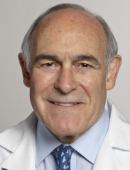
Robert J Desnick, PhD, MD
Genetics and Genomics
About Me
In the News
In this "Daily Check Up" feature from The Daily News, Dr. Desnick talks about treating genetic diseases.
View the PDF.
Language
English
Position
PROFESSOR & CHAIR EMERITUS | Genetics and Genomic Sciences, PROFESSOR | Pediatrics, PROFESSOR | Oncological Sciences, PROFESSOR | Obstetrics, Gynecology and Reproductive Science
Hospital Affiliations
- Mount Sinai Queens
- The Mount Sinai Hospital
Research Topics
Enzymology, Gene Discovery, Genetics, Genomics, Human Genetics and Genetic Disorders, Lysosomal Storage Diseases, Lysosomes/endosome, Protein Complexes, Protein Degradation, Protein Folding, Protein Structure/Function, Proteomics, Stem Cells
Multi-Disciplinary Training Areas
Genetics and Genomic Sciences [GGS]
Clinical Focus
- Gaucher Disease
- Porphyria
- Tay-Sachs Disease
Video
Education
MD, University of Minnesota
Residency, Pediatrics
University of Minnesota Medical School
Certifications
American Board of Medical Genetics/Clinical Genetics
Awards
2010
Distingushed Service Award
Association of American Medical Colleges
2005
Award for Excellence in Clinical Research
National Center for Research Resources, NIH
2005
Albion O. Bernstein, MD Award for Contributions in Disease Prevention
New York State Medical Society
2004
Jacobi Medal
Mount Sinai Alumni Association
2004
Edward H. Ahrens Jr. Award for Research
Association for Patient-Oriented Research
2004
Distinguished Alumni Award
University of Minnesota Medical School
2004
Doctor of Science, Honoris Causa
Mount Sinai School of Medicine of New York University
2004
Elected Senior Fellow,
American Association for the Advancement of Science
2004
Elected Member
Institute of Medicine of the National Academy of Sciences
2003
J. Lester Gabrilove Award for Medical Research
2000
Best Doctors
New York Magazine
1999
Honorary Member
Societá Italiana di Pediatria
1992
NIH MERIT Award
1991
Correspondent Member
Societá Italiana di Pediatria
1991
Outstanding Faculty Award
Mount Sinai School of Medicine
1985
Honorary Member
Japanese Society for Inherited Metabolic Diseases
1981
E. Mead Johnson Award for Research in Pediatrics of the American Academy of Pediatrics
1975
NIH Research Career Development Award
1973
C.J. Watson Award, University of Minnesota
1968
U.S. Public Health Service Fellowship in Genetics
Research
Insurance Information
Physicians who provide services at hospitals and facilities in the Mount Sinai Health System might not participate in the same health plans as those Mount Sinai hospitals and facilities (even if the physicians are employed or contracted by those hospitals or facilities).
Information regarding insurance participation and billing by this physician may be found on this page, and can also be obtained by contacting this provider directly. Because physicians insurance participation can change, the insurance information on this page may not always be up-to-date. Please contact this physician directly to obtain the most up-to-date insurance information.
Insurance and health plan networks that the various Mount Sinai Health System hospitals and facilities participate in can be found on the Mount Sinai Health System website.
Publications
Selected Publications
- Bitopertin shows efficacy in patients with erythropoietic protoporphyria: Results from the randomized, double-blind, placebo-controlled AURORA trial. Amy K. Yeung, Herbert L. Bonkovsky, Manisha Balwani, Karl E. Anderson, Cynthia Levy, Manish Thapar, Bruce Wang, Melanie Chin, Will Savage, Robert Desnick, Siobán Keel. Journal of the American Academy of Dermatology
- Sengers syndrome caused by biallelic TIMM29 variants and RNAi silencing in Drosophila orthologue recapitulates the human phenotype. Adel Shalata, Ann Saada, Mohammed Mahroum, Yarin Hadid, Chaya Furman, Zaher Eldin Shalata, Robert J. Desnick, Avraham Lorber, Asaad Khoury, Adnan Higazi, Avraham Shaag, Varda Barash, Ronen Spiegel, Euvgeni Vlodavsky, Pierre Rustin, Shmuel Pietrokovski, Irena Manov, Dan Gieger, Galit Tal, Adi Salzberg, Hanna Mandel. Human Genomics
- Rapidly progressive, infantile lysosomal acid lipase deficiency: Prevalence in the Mizrahi Jewish population. Donna L. Bernstein, Inga Peter, Robert J. Desnick. Molecular Genetics and Metabolism
Industry Relationships
Physicians and scientists on the faculty of the Icahn School of Medicine at Mount Sinai often interact with pharmaceutical, device, biotechnology companies, and other outside entities to improve patient care, develop new therapies and achieve scientific breakthroughs. In order to promote an ethical and transparent environment for conducting research, providing clinical care and teaching, Mount Sinai requires that salaried faculty inform the School of their outside financial relationships.
Below are financial relationships with industry reported by Dr. Desnick during 2025 and/or 2026. Please note that this information may differ from information posted on corporate sites due to timing or classification differences.
Board Service
- American Porphyrias Expert Collaborative
Consulting or Other Professional Services Examples include, but are not limited to, committee participation, data safety monitoring board (DSMB) membership
- Alnylam Pharmaceuticals, Inc.
- Sanofi Genzyme
Founder/Co-Founder/Partner
- American Porphyrias Expert Collaborative
Mount Sinai’s faculty policies relating to faculty collaboration with industry are posted on our website. Patients may wish to ask their physician about the activities they perform for companies.